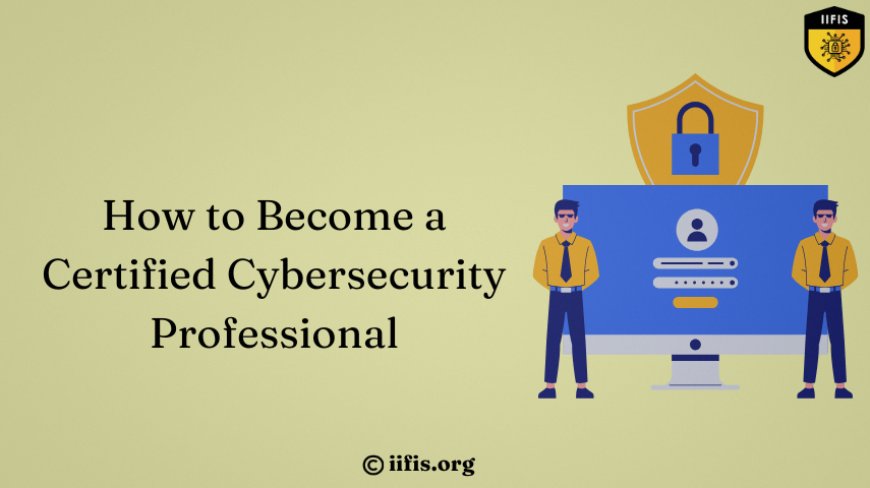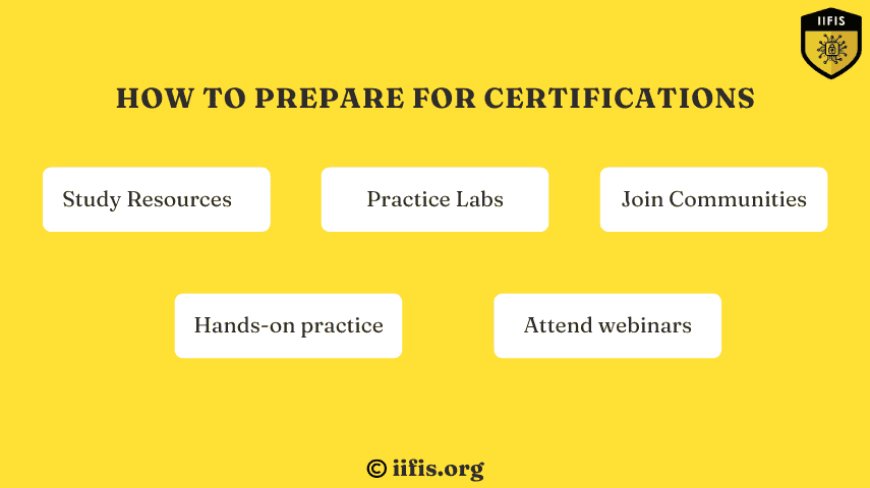How to Become a Certified Cybersecurity Professional
Learn how to become a certified cybersecurity professional with key skills, certifications, and career tips to succeed in the growing cybersecurity field.

Becoming a certified cybersecurity professional has been one of the most rewarding journeys of my career. When I first entered the field, I was struck by how dynamic and ever-evolving cybersecurity is, with new threats and technologies emerging constantly. I've learned that gaining hands-on experience, earning industry-recognized certifications, and staying updated with the latest security trends is key to success.
Along the way, I’ve seen firsthand how cybersecurity professionals are in high demand across various industries, from finance to healthcare to government. If you're considering a career in this field, I can confidently say that the path is both challenging and incredibly fulfilling, offering endless opportunities for growth and innovation.
Understand the Cybersecurity Landscape
Cybersecurity is a dynamic and ever-evolving field. It involves protecting systems, networks, and data from digital attacks, unauthorized access, and data breaches. Understanding the landscape of cybersecurity is critical because it gives you a broad view of its importance and the types of threats that organizations face. This includes:
-
Types of Cyber Threats: These range from malware and phishing attacks to advanced persistent threats (APTs) and ransomware. Each threat has its own prevention and mitigation strategy.
-
Key Areas of Cybersecurity: Network security, application security, cloud security, incident response, ethical hacking, and data protection are just some of the key domains.
-
Cybersecurity Frameworks: Familiarize yourself with frameworks like the NIST Cybersecurity Framework, ISO/IEC 27001, and CIS Controls. These offer structured approaches to securing systems.
Pursue Relevant Education and Training
While self-study is valuable, a structured education in cybersecurity provides you with a solid foundation. Here are some ways to pursue education:
-
Formal Education: A degree in computer science, information technology, or a related field is a strong start. Many universities offer specialized cybersecurity programs.
-
Online Courses and Bootcamps: Different platforms offer specialized courses. Bootcamps, such as those from SANS or Cybrary, provide focused training in cybersecurity areas like ethical hacking or incident response.
-
Vendor-Specific Training: Many tech giants, offer training specific to their products. This can give you expertise in securing environments built on these platforms.
Gain Practical Experience
Theory alone isn’t enough in cybersecurity. You need hands-on experience to develop your skills and confidence. Here are a few ways to gain practical experience:
-
Lab Work: Set up a home lab using virtual machines (VMs) to practice penetration testing, network defense, and ethical hacking. Tools like Kali Linux, Metasploit, and Wireshark are essential.
-
Internships and Entry-Level Jobs: Look for internships or junior security analyst roles to gain experience. Real-world exposure to systems and threat landscapes is invaluable.
-
Capture the Flag (CTF) Challenges: Participate in CTF challenges or online hacking competitions like Hack The Box or TryHackMe. These platforms simulate real-world scenarios that help you hone your technical skills.
Choose and Earn Industry-Recognized Certifications
Certification is one of the most important steps to becoming a recognized cybersecurity professional. Here’s how to prepare for popular certifications:
How to Prepare for Certifications:
-
Study Resources: For each certification, study the official course material, practice exams, and recommended reading lists. Many certification providers offer online courses to help you prepare.
-
Practice Labs: Hands-on practice is essential. For example, if you're studying for the Certified Ethical Hacker (CEH), using penetration testing labs or environments like Hack The Box will give you real-world scenarios.
-
Join Communities: Engage with online communities such as Reddit, LinkedIn, or specific certification forums where members share resources, experiences, and study tips.
-
Time Management: Set a study schedule. Most certifications require several months of preparation, depending on your current level of knowledge and experience.

Top Cybersecurity Certifications:
-
CompTIA Security+: This entry-level certification is perfect for those new to cybersecurity. It covers foundational topics like risk management, network security, cryptography, and threat analysis.
-
Certified Ethical Hacker (CEH): If you’re interested in penetration testing and ethical hacking, CEH is one of the most recognized certifications. It covers tools and techniques used by hackers to exploit vulnerabilities.
-
Certified Information Systems Security Professional (CISSP): This is an advanced certification for experienced professionals and is especially useful for those interested in cybersecurity management or governance.
-
Certified Cloud Security Professional (CCSP): As businesses move to the cloud, securing cloud infrastructure becomes critical. The CCSP is perfect for those interested in secure cloud-based systems.
-
Certified Information Security Manager (CISM): Focused on security management CISM is ideal for those who want to oversee and manage enterprise-level security.
Stay Updated with Emerging Threats and Technologies
Cybersecurity is a constantly changing field. New vulnerabilities, attack techniques, and defense technologies are emerging all the time. To remain effective, you need to stay updated. Here’s how:
-
Cybersecurity News: Follow cybersecurity blogs and news sources like ThreatPost, Dark Reading, and KrebsOnSecurity. These sites offer insights into the latest threats and breaches.
-
Professional Associations: Join groups like ISC², ISACA, or the Information Systems Security Association (ISSA). These organizations provide resources, certifications, and community support.
-
Conferences and webinars: Attend cybersecurity conferences such as Black Hat, DEF CON, or RSA Conference. These events bring together experts from across the world to discuss emerging trends and advanced techniques.
Build a Professional Network
In cybersecurity, networking isn’t just about meeting people—it's about learning from others, sharing knowledge, and finding job opportunities. Here’s how to build a professional network:
-
Join Online Communities: Participate in cybersecurity forums and communities like Reddit's r/cybersecurity, Stack Exchange, and Twitter groups. These are great places to learn and share experiences.
-
LinkedIn: Optimize your LinkedIn profile to reflect your skills, certifications, and experiences. Connect with professionals in the field, and stay active by sharing relevant articles and insights.
-
Mentorship: Find a mentor who can guide you as you navigate the field. Many experienced cybersecurity professionals are open to sharing their knowledge with newcomers.
Industries Seeking Cybersecurity Professionals
Cybersecurity is in demand across virtually every sector due to the increasing number of cyber threats. The following industries are particularly looking for cybersecurity talent:
-
Finance: Financial institutions handle sensitive data and are frequent targets of cyberattacks. Banks, insurance companies, and investment firms need security analysts, risk managers, and compliance experts.
-
Healthcare: With the rise of electronic health records (EHR) and other digital healthcare systems, cybersecurity professionals are needed to secure patient data and comply with regulations such as HIPAA.
-
Government: Local, state, and federal agencies face constant threats to national security. Cybersecurity professionals are needed for everything from network defense to counterintelligence.
-
Tech & Software: Companies in tech, such as Google, Microsoft, Amazon, and Apple, are always looking for experts to secure their products, networks, and services.
-
Telecommunications: With increasing reliance on digital communications and cloud services, telecom companies need cybersecurity experts to protect customer data and infrastructure.
-
Energy: Critical infrastructure like power grids, water systems, and oil & gas facilities are often targeted by cybercriminals. Security professionals are needed to safeguard these assets.
Benefits of a Certified cybersecurity professional
Becoming a certified cybersecurity professional offers numerous benefits:
-
Career Opportunities: High demand for skilled cybersecurity experts leads to job security and growth across industries.
-
Higher Salaries: Certifications boost earning potential and can open doors to higher-paying roles, especially in specialized areas.
-
Skill Validation: Certifications validate your expertise, increasing credibility with employers and peers.
-
Continuous Learning: Staying certified ensures you're updated with the latest tools and technologies in cybersecurity.
-
Networking: Certifications connect you to a professional network, expanding career opportunities and collaborations.
-
Job Satisfaction: The field offers intellectually challenging work with the rewarding opportunity to protect vital digital assets.
-
Advancement: Certified professionals are positioned for leadership roles and specialized expertise in cybersecurity.
If you're considering a career in cybersecurity, I highly recommend taking the plunge. From my experience, this field is both rewarding and full of opportunities. Start by building a solid foundation with formal education, hands-on practice, and certifications like CompTIA Security+, CEH, or CISSP. These will establish your credibility and technical skills.
Additionally, I suggest looking into specialized certifications like those from IIFIS (International Institute for Information Security), which offer targeted training in areas like penetration testing and security auditing. These certifications can give you a competitive edge and deeper expertise. The journey is challenging, but the rewards—both in terms of knowledge and career prospects—are well worth it.
























